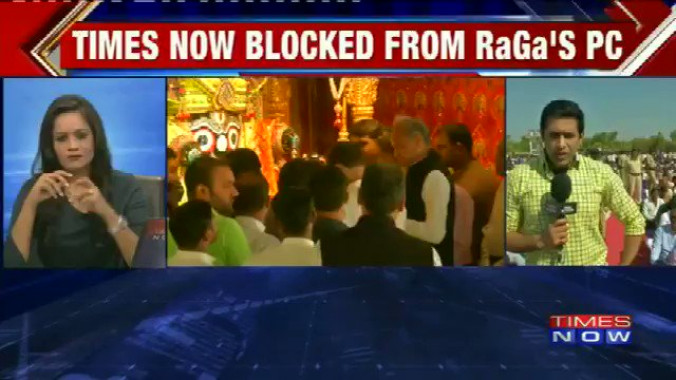Watch out--next time it could be you
As if the reports of the Congress barring Times Now and Republic TV from its press conferences were not bad enough, what is even more distressing is the silence from professional associations like the Editors’ Guild, various journalist unions, and the Press Club of India and the Indian Women’s Press Corps, who are otherwise ever ready with statements on growing attacks on media freedom.
But apparently, it is more than silence. As the tweets quoted in this article in Newslaundry, along with my own conversations with others in the fraternity show, many journalists feel that these two organisations deserve what has happened to them, that they have got their comeuppance. Even the newslaundry.com article ends with gratuitous advice to Republic TV and Times Now to do some introspection on the kind of journalism they do.
This kind of they-deserve-it attitude was in ample evidence when activist Shehla Rashid asked a Republic TV journalist to `get out’ when she was addressing the media outside the Press Club, ironically at an event to protest about the killing of journalist Gauri Lankesh and uphold media freedom. While senior journalists like Shekhar Gupta did publicly slam Rashid, there were many others who sought to make light of what she did. Journalist G. Sampath wrote a Facebook post which went viral, justifying Rashid’s stand.
Now this is simply not on.
Republic TV may not be adhering to accepted norms of journalism. The hounding of individuals in public spaces by its journalists may be cringe-worthy. Many journalists may not be ideologically aligned with it. Even those ideologically aligned may be appalled by its brand of journalism. But that does not, absolutely does not, justify silence or active participation in throwing it out of press meet venues, as did an India Today television journalist who, during a press interaction with Mani Shankar Aiyar, told a Republic TV journalist “we will not allow you to pursue your agenda” and ordered him to leave the room.
Aiyar had said he would answer questions from other channels but not Republic TV. He may have been justified in taking the stand he did; the reporter of the rival channel was not.
This is not about X or Y or Z channel. It is about the rights of journalists to go about their work. Press conferences are an essential part of it. And it is not as if the action by the Congress is a one-off ban limited to what the fraternity would like to see as two `rogue’ news channels.
In 2007 a senior minister in the United Progressive Alliance government in charge of an economic portfolio barred an entire group (television/print/wire service) from attending any of the press conferences he addressed. The room would be `sanitised’; if anyone from that group was seen, staff from his office as well as the Press Information Bureau official would ensure they left the room before the minister came.
This writer was witness to one young journalist who had not been recognized - and hence not escorted out - not being allowed to ask a question once she identified her organisation. The `ban’ continued for a few months.
Last year Stanley Pignal, the Economist correspondent in Mumbai, had tweeted about being denied entry into the post monetary policy press conferences by the Reserve Bank of India governor. It then turned out that the BBC World Service too had been denied entry. The RBI apparently quoted space constraint as a reason, but connections were quickly drawn to the Economist’s trenchant criticism of demonetisation. Pignal still does not get invited.
Barring journalists from press conferences or other public events by political parties/individual ministers on the grounds of newsroom bias, reporting or for asking inconvenient questions, is a way of bringing them and their organisations to heel.
The UPA minister was miffed at a particular anchor of the television channel for, during an interview, used a very offensive tone. It would have been enough for him to have refused to be interviewed by that particular anchor in future, but barring the whole group from press conferences was sending out a message – treat me with kid gloves or else.
Ministers/political party representatives/corporate honchos regularly have select briefings for small groups of journalists. Invariably, this is limited to journalists they are comfortable with or to whom they want to pitch a particular line (and are confident that the line will be picked up). Refusing to give exclusive interviews is another way of showing unhappiness with media bias.
But press conferences are a different matter altogether. What Pignal said in an email to this writer just about sums it up: “press conferences are about the press, not the institution.”
And that is why not fighting for a rival’s access to a select briefing is okay, but rationalising barring of individual organisations from press conferences/public functions is not.
Being complicit in this could see the practice spreading. What if, tomorrow, the BJP decides to ban NDTV journalists from its press conferences? Remember its spokesperson Sambit Patra accusing it, on air, of being driven by an agenda? Ironically, that statement was linked to the tax raids on NDTV’s founders and seen as an attack on media freedom by the same set of journalists that is now equivocating the bans on Times Now and Republic TV.
What if other political parties and state governments start doing the same, and the target then are journalists or organisations who are now taking delight in the plight of these two channels?
This is one area in which professional rivalries need to be set aside. If some organizations or journalists are going rogue, that needs to be condemned. But that condemnation should not extend to complicity on a matter that is about journalists’ right to go about their work.
Seetha is an indepedent journalist and author. She tweets at @soorpanakha.
